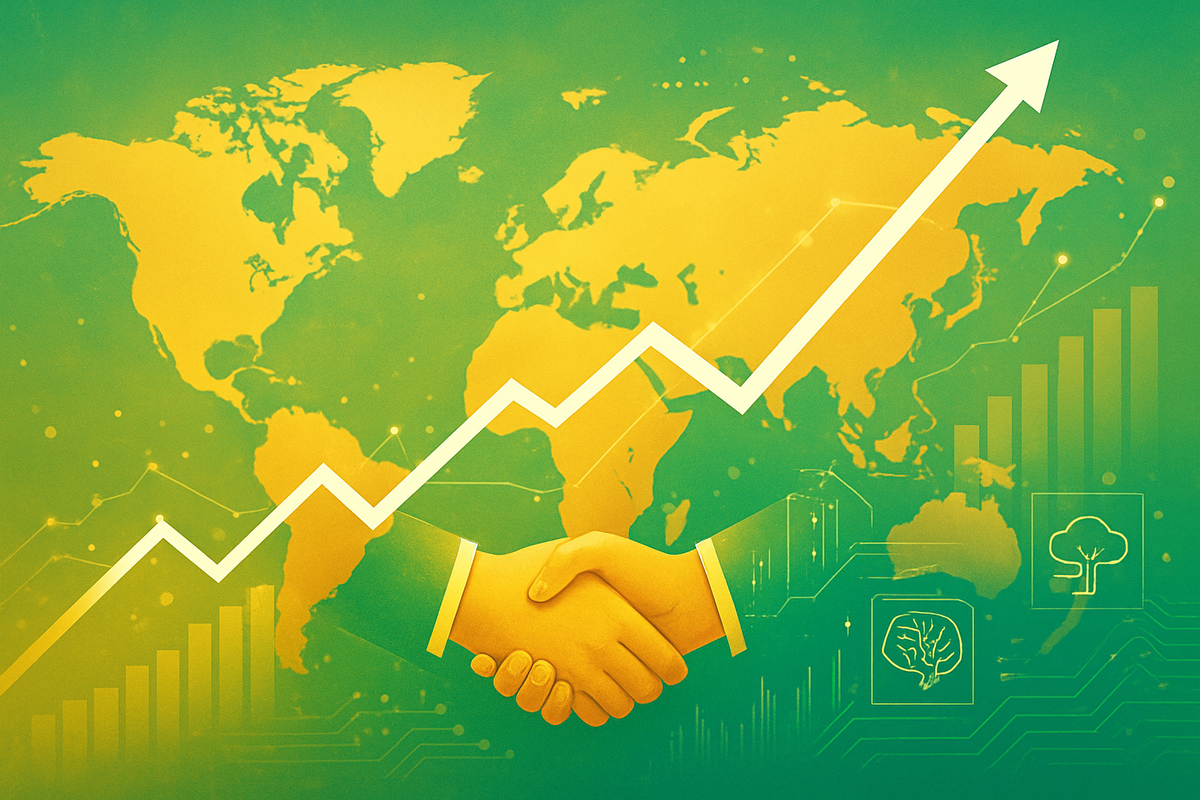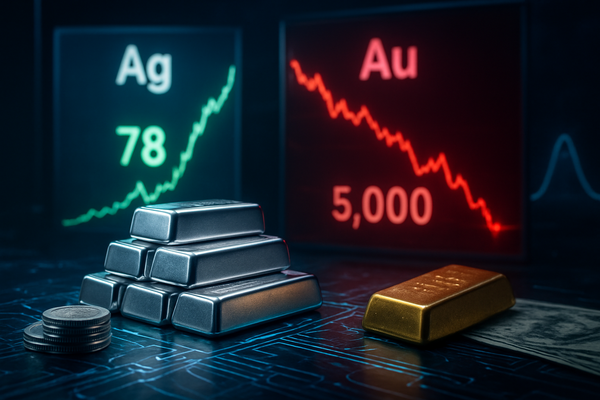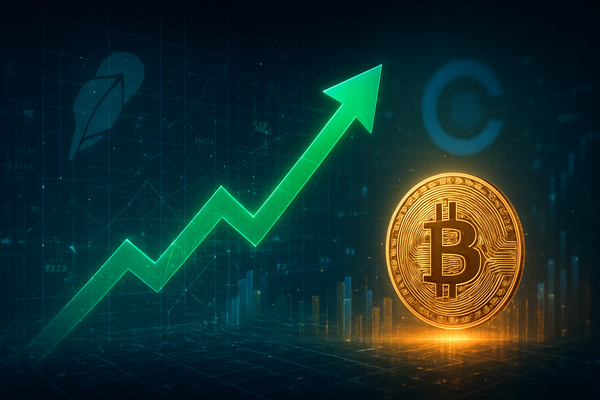Global Markets Surge: Trade Tensions Cool, Tech Sector Ignites Record Highs

Global financial markets are experiencing a significant uplift today, October 28, 2025, as investor optimism returns amidst cooling trade tensions between major economic powers and a relentless surge in the technology sector. While some global markets witnessed profit-taking after recent rallies, U.S. stock indices roared to new record highs, signaling renewed confidence in the economic outlook and the transformative power of technological innovation. This powerful combination of de-escalating geopolitical risks and robust sectoral performance is reshaping market dynamics and setting the stage for potential further gains.
The immediate implications of these developments are multifaceted. The prospect of a comprehensive trade deal between the United States and China has significantly reduced uncertainty, leading to a palpable sense of relief across various industries. Simultaneously, the technology sector, particularly driven by advancements in Artificial Intelligence, continues its formidable ascent, attracting substantial investment and pushing valuations to unprecedented levels. This dual catalyst has created a buoyant market environment, though analysts caution that underlying economic fundamentals and potential market overheating warrant close monitoring.
De-escalation and Innovation: The Dual Engines of Growth
The current market rally is largely attributable to a significant de-escalation in trade tensions, primarily between the United States and China. Anticipated meetings this week between U.S. President Trump and Chinese leader Xi Jinping, coupled with a definitive statement from U.S. Treasury Secretary Scott Bessent that 100% tariffs on Chinese goods were "off the table," have fueled widespread optimism. This perceived shift from confrontation to negotiation has been a critical factor in improving investor sentiment, particularly for sectors previously vulnerable to escalating tariff wars. While not a complete resolution, this "trade pause" is seen as a crucial step towards stabilizing global economic relations.
Initial market reactions have been largely positive, though varied across regions. U.S. stock indices, including the Dow Jones Industrial Average, S&P 500, and Nasdaq Composite, all achieved fresh record highs. However, Asian and European markets, such as Japan's Nikkei, South Korea's Kospi, Germany's DAX, and France's CAC 40, largely saw profit-taking after recent robust gains, reflecting a cautious but generally positive global outlook. Currency markets also reacted, with the Chinese yuan strengthening modestly against the U.S. dollar, while safe-haven assets like gold experienced a notable decline of over 4% over two days, signaling reduced risk aversion. Commodity prices, including Brent crude and WTI oil, also fell, partly due to concerns over global supply, while industrial metals stabilized.
Concurrently, the technology sector continues its seemingly unstoppable march upward, acting as a primary driver of the U.S. market's strength. The tech-heavy Nasdaq Composite closed at a new record, climbing 1.9%, with the S&P 500 Information Technology (Sector) recording a 2.02% gain. This robust performance is largely attributed to the sustained dominance of the "Magnificent 7" tech giants and the pervasive "AI euphoria." Investors are increasingly betting on the transformative potential of Artificial Intelligence, leading to significant capital inflows into companies at the forefront of AI innovation. Strategic advancements and sustained investor confidence in disruptive technologies are reinforcing the technology sector's leading role in the broader market.
Corporate Beneficiaries and Market Movers
The current market landscape presents clear winners, particularly within the technology sector. Companies at the vanguard of AI development and those with strong market positions are experiencing substantial gains. Microsoft (NASDAQ: MSFT) climbed 2% after solidifying a pact with OpenAI, which reportedly gives the software giant a 27% ownership stake valued at approximately $135 billion, pushing Microsoft's market capitalization past $4 trillion. Apple (NASDAQ: AAPL) also briefly surpassed a $4 trillion market capitalization, with its shares inching up 0.1% after hitting an all-time high the previous day.
Chipmakers are also seeing significant boosts. Nvidia (NASDAQ: NVDA) shares rose 5% to an all-time high following its CEO's keynote address on artificial intelligence and news of a $1 billion investment in Nokia. Similarly, Qualcomm (NASDAQ: QCOM) jumped an impressive 11.1% after unveiling a new AI chip designed for data centers, underscoreing the intense competition and innovation in the AI hardware space. These companies are not just riding a wave; they are actively shaping the future of technology and reaping the financial rewards.
Conversely, companies heavily reliant on commodity prices or those in industries that thrive on geopolitical uncertainty might face headwinds. The significant drop in gold prices, for instance, could impact gold mining companies and related investment vehicles. Similarly, oil and gas companies might experience pressure from declining crude prices, though the overall economic optimism could temper these effects. Companies with extensive global supply chains, while benefiting from reduced trade tensions, will need to adapt to the evolving regulatory and economic environment.
Broader Significance and Historical Parallels
This confluence of cooling trade tensions and a booming technology sector carries wider significance for global economic trends. The de-escalation of trade disputes suggests a potential shift towards a more stable, albeit complex, global trading environment. This could alleviate pressure on supply chains, foster greater international investment, and potentially lead to a resurgence in global trade volumes. It also signals a recognition among major economic powers of the detrimental impact of prolonged trade conflicts on their respective economies and the global system. This event fits into a broader trend of recalibrating international relations, moving from heightened protectionism towards a more pragmatic approach to economic engagement.
The relentless rise of the technology sector, particularly driven by AI, represents a significant structural shift in the global economy. This isn't merely a cyclical boom but rather a foundational transformation akin to the internet revolution or the advent of personal computing. The "AI euphoria" is pushing companies to invest heavily in research and development, potentially creating ripple effects across various industries, from healthcare and finance to manufacturing and logistics. Competitors that fail to adapt and integrate AI into their core operations risk being left behind, while partners in the AI ecosystem stand to benefit immensely. Regulatory bodies worldwide are also grappling with the implications of AI, with discussions around data privacy, ethical AI, and market dominance likely to intensify, potentially leading to new policies and frameworks.
Historically, periods of reduced geopolitical tension have often correlated with increased economic activity and market stability. The current situation draws parallels to moments when major powers have stepped back from the brink of economic conflict, allowing for a reallocation of resources towards growth and innovation. The tech sector's current trajectory, while reminiscent of the dot-com boom in its enthusiasm, is underpinned by more tangible technological advancements and widespread enterprise adoption, suggesting a more sustainable, albeit potentially volatile, growth path. The Federal Reserve's ongoing two-day meeting, with expectations of a 25 basis point interest rate cut, further underscores a policy environment aimed at fostering economic expansion.
Navigating the Path Ahead: Opportunities and Challenges
Looking ahead, the short-term outlook is characterized by cautious optimism. The immediate focus will be on the outcomes of the anticipated trade meetings between the U.S. and China. A concrete agreement or even significant progress could sustain the current market momentum, further reducing uncertainty and encouraging investment. However, any unexpected setbacks or a failure to reach a substantial agreement could quickly reverse sentiment, leading to market volatility. In the long term, the trajectory of the technology sector, particularly AI development, will be a critical determinant of market performance. Continued innovation, successful commercialization of AI applications, and effective management of regulatory challenges will be key to sustaining its growth.
Market opportunities will likely emerge in sectors poised to benefit from both cooling trade tensions and technological advancements. Companies involved in global trade, logistics, and manufacturing could see increased demand. Furthermore, the AI revolution will continue to create opportunities in software, hardware, data services, and specialized AI applications. Investors may also find opportunities in companies that are strategically integrating AI into their operations, improving efficiency and creating new revenue streams. However, challenges remain, including potential market overheating in the tech sector, the risk of a global economic slowdown if trade talks falter, and the ongoing need to address supply chain vulnerabilities.
Potential scenarios range from a "Goldilocks" outcome—where trade tensions dissipate, AI drives robust economic growth, and central banks maintain accommodative policies—to more challenging scenarios involving renewed trade conflicts or a tech bubble bursting. Strategic pivots will be required for businesses to adapt to this evolving landscape, focusing on resilience, innovation, and global collaboration. Market participants should closely monitor geopolitical developments, central bank policies, and technological breakthroughs to identify emerging opportunities and mitigate risks.
A New Era for Global Markets?
Today's market surge, driven by cooling trade tensions and the relentless ascent of the technology sector, marks a significant moment for global financial markets. The immediate takeaway is a renewed sense of optimism, as investors embrace the prospect of a more stable international trading environment and the transformative potential of artificial intelligence. The performance of tech giants like Microsoft, Apple, Nvidia, and Qualcomm underscores the profound impact of AI on corporate valuations and market leadership.
Moving forward, the market will be keenly focused on the tangible outcomes of the U.S.-China trade discussions. A successful resolution could unlock further economic growth, while any faltering could reintroduce volatility. The technology sector's trajectory, particularly the sustainable growth of AI applications, will remain a central theme, with its capacity to drive innovation and reshape industries. Investors should watch for continued developments in trade negotiations, central bank policy shifts, and the evolving landscape of AI innovation.
This period represents a potential turning point, where a reduction in geopolitical friction could coincide with a technological revolution, ushering in a new era for global markets. While the path ahead may not be without its challenges, the current confluence of events suggests a powerful tailwind for growth and innovation.
This content is intended for informational purposes only and is not financial advice



